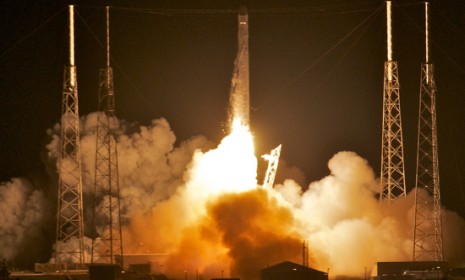SpaceX's successful launch: 4 predictions for what's next
The first privately owned spacecraft is making its inaugural delivery trip to the International Space Station, ushering in a new era of space travel

A free daily email with the biggest news stories of the day – and the best features from TheWeek.com
You are now subscribed
Your newsletter sign-up was successful
For the first time ever, a privately owned spacecraft successfully blasted off Tuesday, representing a monumental transition in the future of space travel. SpaceX's Falcon 9 launched from Cape Canaveral, Fla., carrying a cone-shaped space capsule, named Dragon, filled with supplies headed for the International Space Station. Here, four predictions about what it all means:
1. We'll soon welcome a new generation of rocketeers...
"NASA isn't the only game in town anymore," says Pete Spotts at The Christian Science Monitor. Rocket scientists, aerospace engineers, and aspiring astronauts will now start looking to "'New Space' companies to boldly go where only governments used to go." Options used to be scarce for aerospace-engineering students — NASA, Boeing, Lockheed Martin — but the burgeoning private industry is proving to be more alluring to the "new generation of would-be rocketeers."
The Week
Escape your echo chamber. Get the facts behind the news, plus analysis from multiple perspectives.

Sign up for The Week's Free Newsletters
From our morning news briefing to a weekly Good News Newsletter, get the best of The Week delivered directly to your inbox.
From our morning news briefing to a weekly Good News Newsletter, get the best of The Week delivered directly to your inbox.
2. ...And see a private-sector space race
The success of SpaceX could spark "a new space race not between nations, but in the private sector," says Alfred Joyner at the International Business Times. Imagine a "space-travel free market" in which companies compete to establish the most cost-effective means of traveling across the solar system. Blue Origin, Sierra Nevada Corp., and Boeing are already competing for lucrative NASA contracts, says Karsten Strauss at Forbes, but that's just the beginning of "Earth's 'outer orbit economy.'" From passenger space vehicles to plans for a new space station, the entrepreneurial opportunities are endless. Thanks to SpaceX, "we may be one step closer to opening up the cosmos for business."
3. NASA will shift its focus
John Holdren, President Obama's assistant for science and technology, declares that "this expanded role for the private sector will free up more of NASA's resources to do what NASA does best — tackle the most demanding technological challenges in space." That includes "human space flight beyond low Earth orbit" or, says Christine Harbin at Policy Mic, missions to Mars.
A free daily email with the biggest news stories of the day – and the best features from TheWeek.com
4. One day, you may take a vacation in space
SpaceX predicts that it could be operating manned private space flights by 2015. And even beyond SpaceX, says Harbin, we're looking at a future in which more commercial spacecraft could enter the market, potentially opening up space for tourism.
-
 The Olympic timekeepers keeping the Games on track
The Olympic timekeepers keeping the Games on trackUnder the Radar Swiss watchmaking giant Omega has been at the finish line of every Olympic Games for nearly 100 years
-
 Will increasing tensions with Iran boil over into war?
Will increasing tensions with Iran boil over into war?Today’s Big Question President Donald Trump has recently been threatening the country
-
 Corruption: The spy sheikh and the president
Corruption: The spy sheikh and the presidentFeature Trump is at the center of another scandal